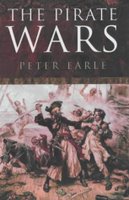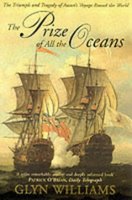

Several years ago I had an argument with some people about Pirates of the Caribbean: Something Or Other About a Pearl, I Think and Master and Commander: The Far Side of the World, two films about the Great Age of Sail. I didn't like the pirate film as much as the one about the British navy. At the time I put this down to many things. One, I wanted to annoy the people I was arguing with.
Two, the pirate film was a fairly hacky summer blockbuster that was crying out to have been made by Rob Reiner but instead was made by Gore Verbinksi, so instead of being The Princess Bride it was more like Cutthroat Island.
Three, I hate fun. I don't really hate fun, but everyone thinks I do, so I may as well go along with it.
Four (and really, this is the main one), I'm just not that interested in pirates. I don't know why. They sail around in ships and have adventures. They board other ships, launch broadsides against their enemies, live in caves and drink rum. They have a special pirate code (no, they really do) and they live in groovy little colonial outposts in the Caribbean. But I don't care.
Sadly, Peter Earle's book didn't do anything to make me care any more. For a start, it's a bit too much of an overview, and if I like anything, it's a detailed history of one bit-player who turns out to be pivotal in the whole history of everything ever (see Nathaniel's Nutmeg for the best example of this) and provides you with a great test case. But Earle doesn't do this. He sets out his store in good scholarly fashion, tells you what he's going to tell you, then tells you it, citing examples along the way. It ends up being a bit routine. There were pirates here. So the British government sent out ships and passed laws and gradually arrested or killed all the pirates so then there were no pirates. The end. Not packed with dashing incident and anecdote, as one would hope.
Ne'er mind, Vicar. But you did a lot better with The Prize of all the Oceans. In 1741, Commodore George Anson set sail from England with five ships and a total crew of approximately 1400 men. He had orders to sail to South America, map some territories and harass Spanish shipping. He had a diasastrous voyage and returned with one ship and about 500 men. But along the way he captured prizes worth about £400,000. Glyn Williams details everything about the expedition and it's all really exciting, including the adventures of the Wager, one of the smaller ships, which ended up wrecked on a remote island in South America, leaving the crew stranded and forced to find their way back to England in a bewlidering variety of ways. A fantastic book, well worth reading. Not least because the Chinese couldn't tell the difference between His Majesty's ship of war towing a prize and, well, pirates.
1 comment:
I am annoyed! So, er, top work there.
Post a Comment